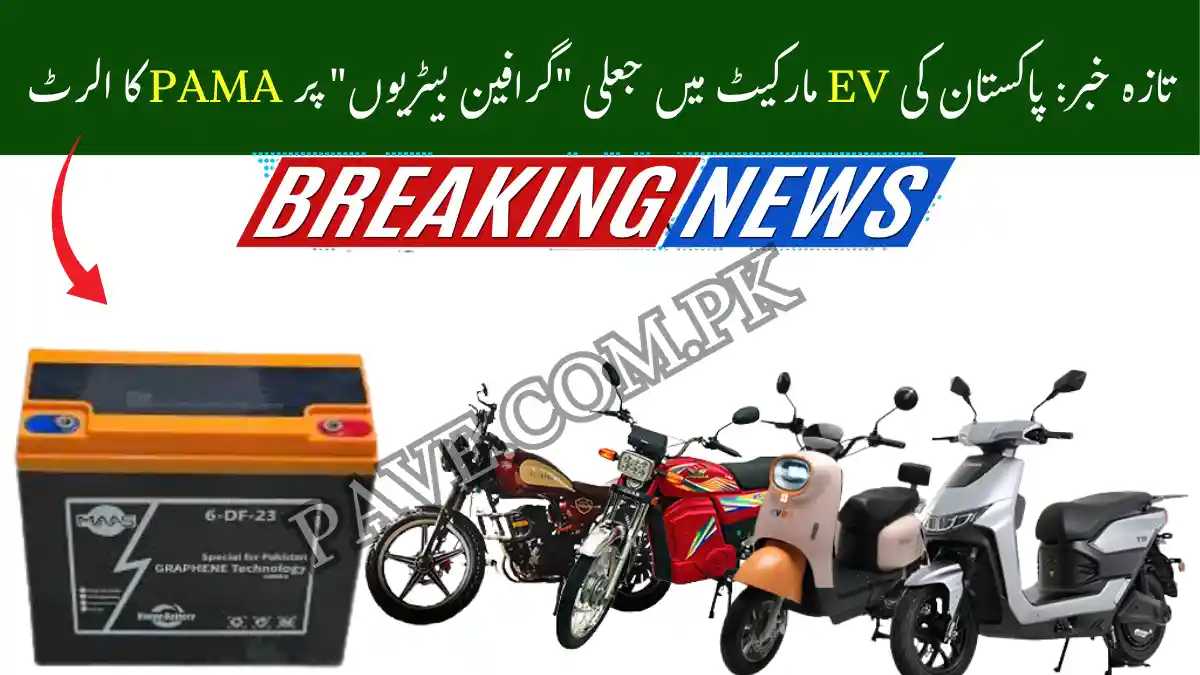Breaking News: PAMA Sounds Alarm on Fake Graphene Batteries in Pakistan EV Market

In a shocking revelation that has stirred Pakistan’s electric vehicle (EV) industry, the Pakistan Automotive Manufacturers Association (PAMA) has reported that nearly 90% of electric bikes in Pakistan are fitted with fake graphene batteries — which are in reality, outdated lead-acid batteries rebranded under misleading marketing.
This alarming disclosure puts the integrity of Pakistan’s electric mobility revolution at risk, raising serious questions about battery safety, consumer trust, and misuse of government subsidies.
The issue of Fake Graphene Batteries in Pakistan has now become a major national concern as the government continues to promote electric mobility under its PAVE Program 2025–30, with billions in incentives aimed at promoting genuine lithium-ion technology.
The Reality Behind “Graphene” Claims
According to PAMA Director General Abdul Waheed Khan, several local electric bike assemblers and importers are using misleading marketing tactics to boost sales. These companies rebrand old lead-acid batteries as “graphene batteries,” despite no scientific or performance evidence to support such claims.
“This trend is deeply troubling,” said Abdul Waheed Khan.
“If the government continues to offer subsidies to these low-quality vehicles, it will damage the credibility of Pakistan’s EV transition and shake consumer confidence.”
Industry insiders say that these so-called “graphene” batteries are nothing more than conventional lead-acid batteries with a thin carbon coating or label redesign. The performance remains poor, offering limited range, slow charging, and frequent replacement needs — a stark contrast to the advanced lithium-ion batteries used globally.
Why Battery Type Matters
The battery is the heart of any electric vehicle, determining its performance, lifespan, and environmental footprint. In genuine EVs, lithium-ion batteries are preferred due to their high energy density, lightweight design, fast charging, and longer life cycle.
In contrast, lead-acid batteries — the same type used in car starters and UPS systems — are heavier, inefficient, and prone to early degradation. They deliver poor mileage and require frequent replacement, often every 8–12 months.
The key issue is that customers believe they are purchasing a modern EV with advanced battery tech, when in reality, they’re getting a decades-old energy system that barely meets minimum safety and performance standards.
Read More: CM Maryam Nawaz Announces 400 New Electric Buses for Punjab Transport
Misleading Marketing Could Derail EV Adoption
Pakistan’s EV market is still in its early stages, with government-led programs like PAVE aiming to create public trust and encourage mass adoption. However, PAMA warns that false marketing claims could cause irreversible damage to that trust.
Consumers who buy “fake graphene” bikes expecting long battery life often end up disappointed within months. Once confidence is lost, it becomes much harder to convince people to switch from petrol motorcycles to electric ones.
Abdul Waheed Khan emphasized that regulatory enforcement is crucial:
“We are not against EVs; we are for sustainable, credible progress. Subsidies must be tied to performance standards, not marketing gimmicks.”
Rs122 Billion Subsidy Reserved for True Lithium-Ion EVs
Under the Pakistan Accelerated Vehicle Electrification (PAVE) Program 2025–30, the federal government has allocated Rs122 billion to boost EV adoption through incentives, subsidies, and local manufacturing support.
The policy specifically targets lithium-ion-based EVs, which meet international safety and performance standards. It encourages the production of locally made electric bikes, scooters, and rickshaws, with a focus on reducing carbon emissions and dependence on imported fuel.
But with fake “graphene” models flooding the market, experts fear a large portion of these subsidies might end up benefiting low-quality assemblers instead of genuine EV innovators — undermining the program’s goals.
Understanding the “Graphene” Hype
“Graphene” has become a buzzword in the battery industry. In theory, graphene — a single layer of carbon atoms — can improve conductivity, reduce charging time, and extend battery life. However, commercially viable graphene batteries are still in the R&D stage globally.
In Pakistan’s case, manufacturers are exploiting this buzz by labeling standard lead-acid batteries as “graphene-enhanced”, without any technological validation. This deceptive practice confuses consumers and creates false expectations about range and durability.
Global experts note that no affordable graphene battery EVs exist yet — making these claims in the local market not only false but potentially fraudulent.
PAMA Urges Quality Control and Government Oversight
PAMA has called on the Engineering Development Board (EDB) and the Ministry of Industries and Production to take immediate action. The body demands that only manufacturers using verified lithium-ion batteries be eligible for EV incentives and tax benefits.
Recommended measures include:
- Establishing a National EV Battery Testing Lab.
- Implementing mandatory certification for battery type and origin.
- Requiring clear labeling and consumer awareness campaigns.
- Penalizing companies that make false “graphene” claims.
“Without oversight, we risk turning the EV revolution into a bubble of false promises,” said a senior industry official familiar with the PAMA findings.
Environmental & Economic Consequences
The use of low-grade lead-acid batteries has severe environmental implications. Improper disposal can lead to lead leakage into soil and water, causing long-term ecological and health hazards.
Moreover, such batteries require frequent replacement, which increases operational costs and generates hazardous waste. This directly contradicts the environmental goals of Pakistan’s Green Transport Initiative and NEV Policy 2025–2030.
From an economic angle, the influx of fake “graphene” bikes also affects consumer confidence, foreign investment, and local innovation. Genuine EV companies face unfair competition from assemblers who cut corners by using outdated parts but still market their products as “next-generation.”
Read More: Top 8 Electric Bikes in Pakistan
The Road Ahead for Pakistan’s EV Future
Pakistan’s electric vehicle market holds enormous potential. With proper policies, infrastructure, and enforcement, it could save billions in fuel imports, create green jobs, and reduce carbon emissions significantly.
However, as experts warn, technology integrity must come first. Subsidizing fake innovations would only slow progress and tarnish the country’s credibility among global investors.
To restore trust, authorities must:
- Ban false advertising related to EV batteries.
- Encourage lithium-ion battery assembly plants within Pakistan.
- Educate consumers about battery types, warranties, and maintenance.
- Link government incentives directly to verified battery performance and certification.
If executed correctly, Pakistan can not only clean its air but also position itself as South Asia’s hub for affordable, safe electric mobility.
Conclusion
The growing scandal of Fake Graphene Batteries in Pakistan is more than just a consumer issue—it’s a national challenge that threatens the credibility of the entire EV sector.
If unchecked, it could waste billions in subsidies, pollute the environment, and crush public faith in electric mobility before it truly begins. But with swift enforcement, transparent standards, and consumer education, Pakistan can still correct course and emerge as a genuine leader in clean transportation.
The future of Pakistan’s EV revolution depends not on fake labels or cheap shortcuts, but on authentic technology, accountability, and trust.










